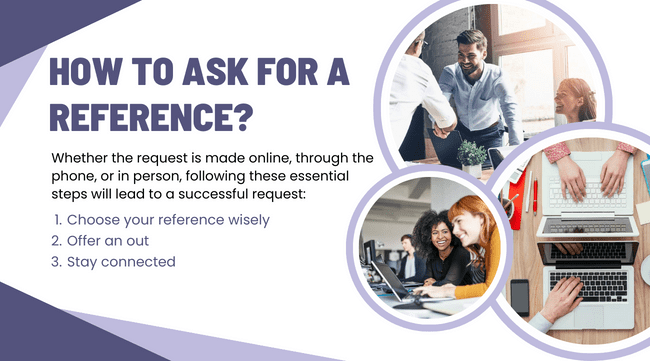In today’s competitive job market, having a few professional references who can vouch for you and the important work you have done throughout your professional career is essential. Professional references differ from personal references and hold a more substantial value. Professional references are individuals who can speak to your skills and abilities as a professional. Personal references can speak to your traits, such as friendliness or honesty. Employers typically want to hear about your hard skills over soft skills to ensure you can do the job. Having two or three strong references can make all the difference in landing your dream job.
How to ask for a professional reference:
Asking for a professional reference can be challenging, but approaching the situation professionally is key. Whether the request is through email, phone, social media, or in person, following these essential steps will lead to a successful request!
- Choose your reference wisely – A supportive reference who can effectively communicate your skills and accomplishments is essential. Opt for someone who can provide a positive portrayal of your abilities. It is best to seek a reference elsewhere if you feel there was tension in the past with an individual. Exploring other options is better when in doubt, especially when someone is going to vouche for you. A reference can make all the difference in securing a job opportunity.
- Offer an out – It’s important to note that some people may have policies against providing references for whatever reason. Therefore, it is vital to offer them a polite way out. You can make it easy for your reference to decline by stating that you understand if they are uncomfortable or unable to provide a reference and are free to decline if they choose. This will allow them the space to refuse without feeling obliged to comply with your request.
- Stay connected – It’s best to establish connections with potential professional references well in advance. Networking and building relationships in a professional setting is the ideal way to develop future references. Feel free to ask for a reference if you feel confident. Maintaining the relationship is crucial, as their support may be necessary in the future. Also, if they agree to help in the future, keep in touch.
Who to ask for a professional reference:
- Manager/Supervisor – Regarding references for a future employer, having your direct manager or someone who you reported to is the best option. They can provide a detailed overview of the skills and qualifications you have demonstrated while working under them. As they know you professionally, they can vouch for your achievements and working relationships with colleagues.
- Clients – Client references can be valuable as they testify to the quality of work you have delivered and your communication and project management skills. It is helpful to have someone who can endorse your work without bias. Such endorsements can come from third-party references who have no personal relationship with you apart from the work you have done for them. Client references are like an outsider’s perspective on your work.
Finding a job can be daunting, especially in a highly competitive market. However, having two to three professional references who vouch for your skills and qualifications can significantly reduce stress. It’s crucial to ensure that the references you provide to a potential employer are professional rather than personal. You can never go wrong with using a manager or client as a reference!
Looking for more ways to succeed in your career? Subscribe to The JOHNLEONARD Blog!


